Trevor Noah On His ‘Daily Show’ Emmy Breakthrough And, Yes, That Old Joke
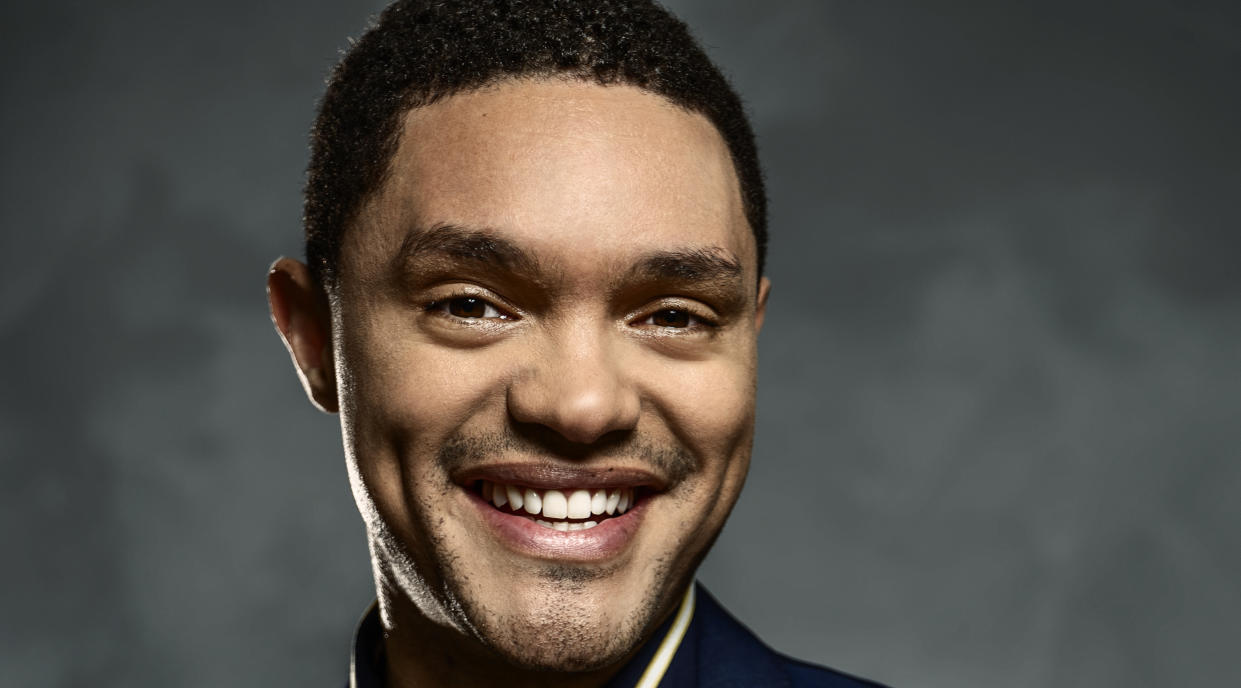
For the first time since Trevor Noah took over from Jon Stewart as host of Comedy Central’s The Daily Show in 2015, the venerable late-night political comedy show found its way back among the Variety Talk Series nominees last month. And as if to illustrate the slings and arrows of comedy in the modern era, the well-liked Noah was just as quickly hit with one of those jokes-from-the-past scandals that might knock a less confident person to the ground. But Greg Evans finds Noah in a reflective mood in his first interview since the controversy hit, dissecting his joke, the backlash, and the expected rush to apology. Just don’t say that old joke was ‘unearthed’. “I’ve never hidden any of my jokes,” he insists. “They’re my jokes…”
The Daily Show is back in the Variety Talk Series pack; your first nomination since taking the host’s chair. What are you doing differently? Or is it the voters that have come around?
That’s interesting. I think it’s a gradual difference. I don’t think you can change a late-night show overnight and expect an immediate result. It’s very much like captaining a giant ship. You put in a few corrections to your steering, and you see it take effect later.
I’m always trying to figure out how we can make the show a little bit better, not just the production, but how do we communicate better with an audience? How are we more authentic? How are we more honest? How do we engage with people? I’m always trying to figure out those increments that can make us better.
Very early on I learned you can’t do everything at once. You can’t move mountains, but what you can do is move pebbles every day and build a new mountain.
But it’s not an easy road to be on, and I’m really proud of our team—two and a half years in, we’ve been nominated. And you look at the other nominees: Nobody’s a slouch.
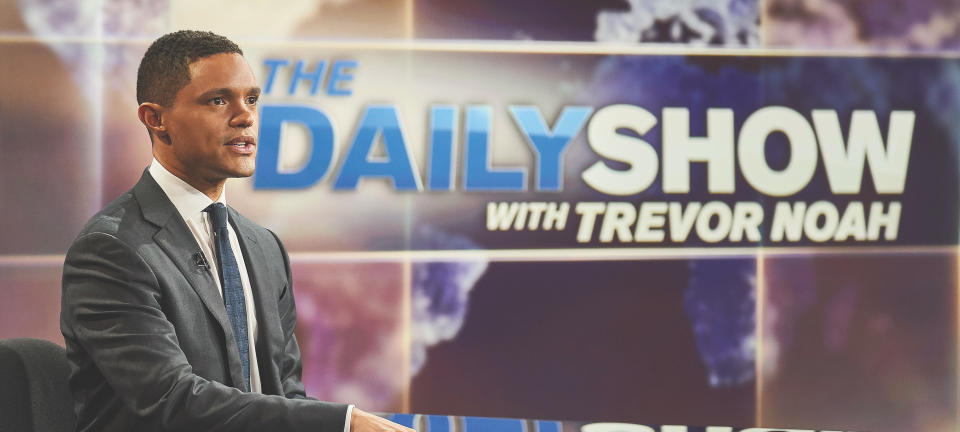
There are a couple people who didn’t make it, and they’re no slouches either…
Right. It’s an extremely competitive category now. There was a time when there were a few shows in it, and now it feels like every show is in it.
Well, don’t tell that to Seth Meyers.
I think Seth is in for writing though. So it’s just a highly populated category, and I’m really proud of The Daily Show with Trevor Noah because this is our first award validation on that level. Though that doesn’t define what we do on the show.
Those pebbles you mentioned moving. Can you name a couple of them?
First of all, you’re introducing yourself to a new audience, and the audience is being introduced to a new host. A show is based on a relationship; especially a show that’s built around satire and political humor. Half of the conversations we have about politics, we have with our friends. So to have an absolute stranger come into your world and start telling you about politics is a very jarring experience. Every pebble is me trying to imbue within each show a little bit of who I am as a human being, sharing personal anecdotes, trying to give the audience a genuine, full picture of who I am. Because we live in a world where people want to know you in an instant, and that’s not realistic.
We came on with almost a completely new roster of correspondents, and so we had to grow each person into a fully-fledged character that the audiences could love. So Roy Wood Jr. comes on board, and from day one I know he’s a star. But it’s like, how do we present Roy Wood Jr. to the audience in his authentic way? Because Roy Wood Jr. is not going to be the same correspondent that Steve Carell was on The Daily Show. But he’s going to be a star in his own right. It was the same with Jordan Klepper, everyone. It’s about building each segment, building each idea.
And then for me, it was about building the show, figuring out how to tweak the writing. One thing that was really interesting and difficult when we started was how people would say, “Oh, The Daily Show has a lot more black jokes.” I was like, “What does that mean?” I had never heard anyone say that before because I had never thought of jokes being black. You, as a performer, may have a race, but the joke is from your point of view.
So what was interesting to me was, how do you bridge the gap between what people perceive as a “black joke” and jokes that they’re more comfortable with? How do you stay true to the comedy that you want to perform and also find a way to bridge the gap to bring people into a world that you now realize they’re completely unfamiliar with?
Is there a sense on your part that you could tell the same joke Jon Stewart might have told and people would think you were doing a “black joke”?
I think you’re right. In a way it’s jarring for people, on multiple levels. I have my face, my skin color, and then I have my accent. So there are all these factors that I don’t take for granted. I love watching TV, and I know what it’s like to watch a show where a character switches out. You are vehemently opposed to the idea for a very long time.
You’re the second Darrin on Bewitched.
[Laughs] I know what you mean, but there’s so many characters like that on TV where I realize how much I loved the person who was hosting the show, so when the person left, I struggled to connect with the new hosts. I had to take that into account on behalf of my audience and say to myself, “Hey, just remember what it feels like to be an audience member working with a new person on an old show.”
It’s time. Relationships are forged through time. There’s no artificial way. It’s all just time. Neal Brennan, who is co-creator of The Chappelle Show, he’s a really good friend of mine. He said to me early on—and he really gave me great advice—he said, “Don’t be afraid of the idea that you’ll be working in a vacuum for a long time.”
How so?
You’ll be working in a world where it feels like nobody is paying attention to you, but you’ve got to keep working. You’ve got to keep making the best show every day. So what I focused on was my audience. Who’s the audience? Who’s watching my show? What do I wish for them to experience when they watch the show?
The first mountain to climb was the ratings. Because you can get all the accolades in the world, but if people aren’t watching, you become the darling that’s off the air.
Once you build that, then you go, “OK, well, critical acclaim?” You can only hope it will come, but you can’t manufacture it.
It’s hard for me to understand the idea of you working in a void. You’re in a huge spotlight. Where is this void?
So this is my view: there’s so much TV now that even TV critics can’t watch it all. I’ve met multiple TV critics who say, “I don’t have time to watch all the shows that I’m trying to critique.”
People then try to find shortcuts. They watch a clip of the show, and a lot of people have based their opinions of TV shows on a clip or a snippet or a YouTube clip. There’s people who don’t know that James Corden has a show. They think he drives around in a car. That’s what I mean about working in a void.
It’s not that no people are watching, it’s that more and more there’s nobody noticing all the good work you’re doing on the show.
But from the beginning of your hosting The Daily Show, you were getting a lot of attention. People wondered whether the show could survive Jon Stewart’s departure. It was a big discussion.
OK, let me put it this way. This is why I notice it: it’s because of when people will come in and comment. Let’s say initially you’re in the news because you’re taking over from Jon. Crazy, right? Everyone goes, “Will it happen? This cannot happen. It’s madness.” Then you take over officially and the first week is, “Can he? Can he not? What is this? Who is he?”
Then people form their opinions. They watch the first week and then a lot of them disappear. There’s like a silence. And then people will dip back in six months [later] to see what’s going on.
But then you’ll see someone commenting saying, “Oh, Trevor Noah said this,” and you realize if they had actually watched the show they would have had the full context. So you find we’re doing a show every day for a week, and in that week we’re building a narrative or story. On the fourth day I tell a joke that’s a call-back to a joke on Monday, and then someone just picks that up and goes, “Trevor Noah just said this.” And you’re like, “Oh, no, no. That was a call-back to an earlier joke…”
You start realizing people are consuming the show in bites. And that’s part of moving those pebbles. I realized I had to create an environment where the show existed beyond just the time slot that we live in.
That’s what birthed Between the Scenes—our whole digital department and the way we approach creating for the Internet on all different platforms.
Which were Emmy nominated as well [The Daily Show was nominated for Outstanding Interactive Program, and Between the Scenes for Outstanding Short Form Variety Series].
That’s something that did not exist at The Daily Show before I got here. And it’s something I aggressively knew we had to push. We had to find a way to make the show live everywhere at the same time.
And I love it. The Daily Show is now the most engaged late-night show on social media. So we’ve done a really great job, and I’m really proud of the digital team that has come in and looked at it as an authentic experience for each platform, as opposed to trying to retrofit.
What we don’t do is just slapdash pieces of the show online. We try and make it a combination of, “Here’s a bit of the show,” and promoting the show, but we’re also creating original content for those platforms. Our Snapchat is designed to be on Snapchat. Our Instagram is for Instagram. There are jokes on Twitter that never get onto the show and vice versa.
Sometimes there’s a synergy between the two, but a lot of the time they’re running independently.
Ever fantasize about the days when people just had one job to do?
Yeah, I mean I sometimes wishfully think about a time when TV was king, but I also think the competitive landscape we’re in pushes you to make a better show. I know that being here for these three years now has made me a better writer, a better producer, a better showrunner.
Has it made you a better man?
I hope so.
You know what I’m getting at here?
Yeah, I know. And yes, I definitely hope so and think so. You know why? We were watching a piece that we made two years ago on the show, and it was crazy because we were like, “We wouldn’t tell that joke today.” Things have changed. The #MeToo movement, the Bill Cosby trial. You look at all the alt-right in Charlottesville, all of these ideas and all of these things that have shaped society very recently.
Comedy lives in a very interesting space. I think it was George Carlin who said the job of a comedian is to find the line, know where it is, and then cross it. I’ve always loved that idea. Because if I’m saying things that don’t jolt you in some way, shape, or form—not to offend necessarily, but just to spark you—then what separates me from an average person who’s just speaking their mind?
The whole point of comedy is you go, “Man, I can’t believe he said that.” And it’s oftentimes a larger truth. It’s an idea that people didn’t even realize they were thinking. You get what I’m saying? That’s what I’ve always loved.
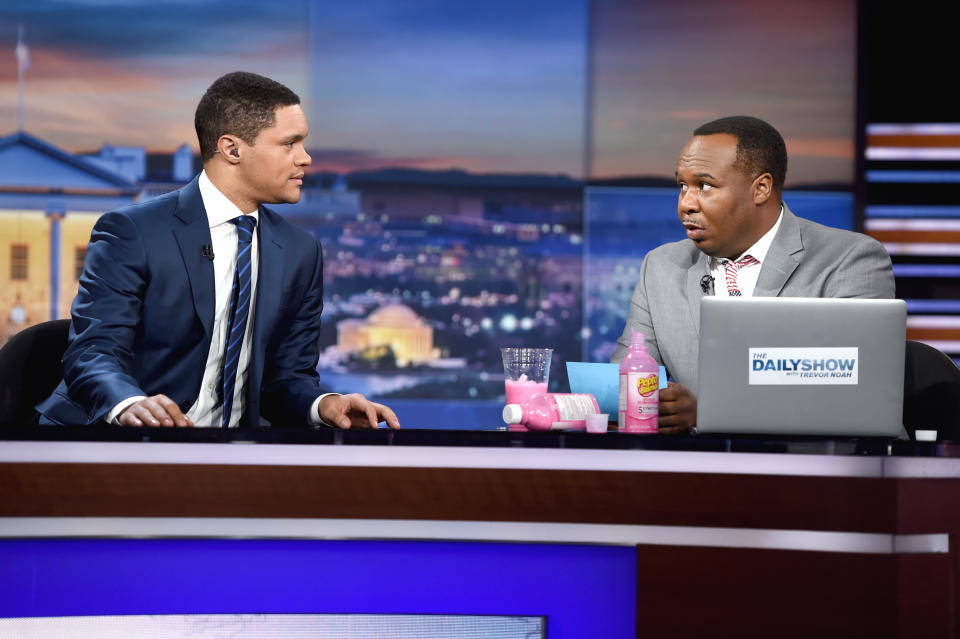
What I have noticed at this show that I’m proud of is we’re also always trying to evolve and move towards a place where we’re sharpening our aim. And we’re moving, I think, progressively towards a better place in comedy.
There’s no denying, even when I got to The Daily Show, you look around the room, and it is a white male-dominated space. If you’re a white man, it’s the best place to be, in a comedy writing room. And then if you’re a man, it’s a great place to be. And then as you start going through you start realizing… You’re like, “OK, as a white woman…” And then you look around and you’re like, “Where are the black female writers?” There are none.
I remember talking to Lena Waithe about that: whatever projects I’m working on, let me know of young—or not—black, talented women who need writing jobs. Because oftentimes they don’t have the avenue to get to those spaces.
When those people were in the room—whether black women, or any women, or members of the LGBTQ community, whoever it is—they just give you a perspective on a joke that you never had. So someone would pitch a joke, people laugh. And then a female writer would say, “No, that sounds like you’re trying to say that this is about women,” or, “it sounds like you’re doing this.” And you go, “Really?” Now you’re engaging in another conversation. You realize how many blinders you have. Same thing with race. Someone would pitch a joke, and then as a comedian of color you’d say to them, “Hey, you do realize that joke seems like you’re saying this…”
I’m hearing you talk very movingly about gender and race, and I’m thinking it must have been very hard for you to have an old recording surface that would seem to go against so much of what you’re talking about right now.
Right.
What is it like to be inside something like that?
You know what’s really difficult, I find, with comedy and an old joke—and the backlash or the outrage that may come with that—is that, firstly, a lot of the time people don’t, with good faith, break down the words of the joke.
A good example is like, let’s say Michelle Wolf, when she was at the White House Correspondents’ Dinner. She told a joke about Sarah Huckabee Sanders burning lies and using them to make a perfect smoky eye.
Now, her joke was about Sarah Huckabee Sanders’ ability to morph the truth and to spin lies. A lot of people interpreted it as her mocking Sarah Huckabee Sanders’ looks. And that’s where comedy gets interesting because now you’re in a place where people are arguing about the intent.
Well, in that case there was a lot of intentional misreading of that joke—people who wanted to say Michelle Wolf was being sexist or mocking Sanders’ looks, because they didn’t want to acknowledge that the joke was about her smearing the truth, not smearing her eyeliner.
But that’s your interpretation of the joke because you approach Michelle with good faith.
This is one of the most fascinating things I’ve learned about comedy. If you poison—or sweeten—the well of somebody’s mind before the joke, they will see what you want them to see. So if I played a clip of comedy for you from anyone, but beforehand I said to you, “Hey, I just want to warn you, this comedian’s really racist,” and I played you the clip, there’s a good chance you would see the racism.
If I played the same clip for you, but beforehand teased it and said, “Hey, I hope you’re excited. This guy is brilliant at navigating race. And it’s interesting how he plays with it.” There’s a good chance you would see it that way as well.
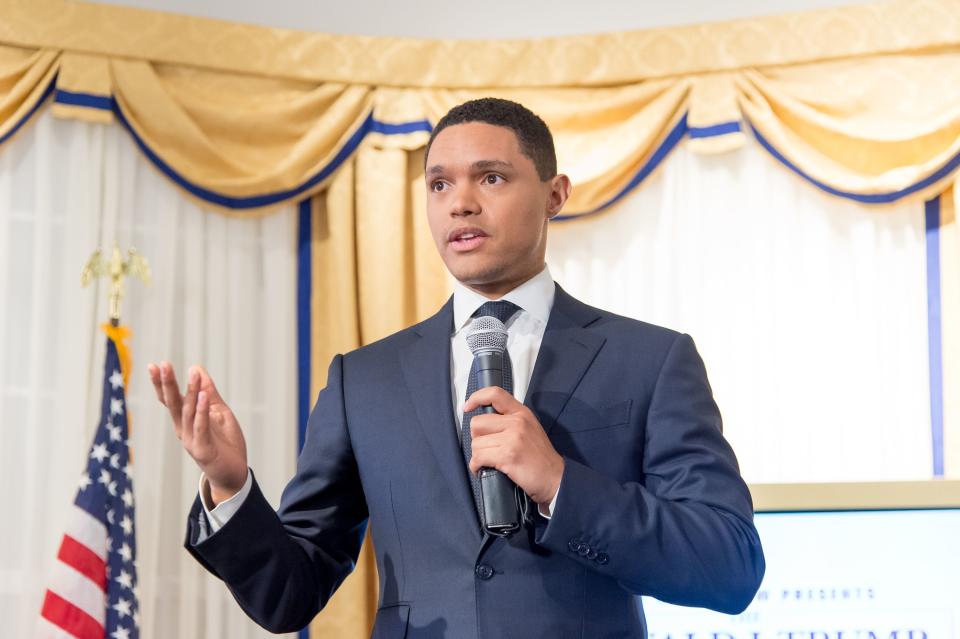
About your joke…
With that joke—and I hate breaking down jokes—but here was a joke where, if I look at the origin of it, in South Africa at the time there was a giant news story. A newspaper had printed a story saying that white people were the most attractive race, and nobody else was attractive. It was this whole thing in Cape Town and it became a fairly big story. Now, that’s just the backstory. Context. Again, this is what I was talking about with comedy and jokes and context.
So I was telling a joke to a South African audience, and they understand the context of what we were talking about in that moment. Comedy and context. If a comedian said what he said on a bus in front of strangers, people would be like, “Who is this mad person who’s spewing hate?” You say it in a comedy club with the wall behind you and the people know they’ve come into a comedy club, people understand that this is a joke and this is what it [means]. You get what I’m saying? Context is everything.
As Trevor, what I was trying to do at the time was make a joke where I was saying that every woman is beautiful in a different way. There’s no measure of beauty. Everyone defines beauty differently.
If I would write the joke today, I hope I would write it differently because I have five more years of comedy writing experience—and accelerated writing experience—at The Daily Show that would help me navigate how to write that joke. But at the time I was like, “I think all women are beautiful,” and somebody had said to me, “You say all women are beautiful, but I’ve never seen a beautiful aboriginal woman.” And I said, “No, you’ve got to say ‘yet’.”
I can’t fight you on what you’ve seen or haven’t seen, but I can say “yet”. That’s specifically in the joke. I say “yet”. Because I’ve heard people say that about every race. I’ve heard people say, “I don’t find Asian people attractive.” Then I’m like, “No. You can say, ‘I have not seen an Asian person that I’ve found attractive,’ but you can’t wipe out an entire race. You just haven’t seen the one [you’ve found attractive] yet.”
So if I was giving a TED Talk, I would just be able to give a clean version of my idea. With comedy you’re trying to stitch in jokes and laughs that help get your message across. And now what sometimes happens is the joke can mar the message, or the joke can blur the message. So people can focus on the joke part of the thing that you were trying to say. If the joke weren’t there, then I would have been able to just give you a clean thesis of my idea. Jokes can work both negatively and positively with regards to a message, I find. So if you said to me, “Hey, Trevor. This joke you told is a joke that can be used in a negative, or a joke that can be perceived this way, or whatever.” That’s what I’ve learned about comedy all over the world. I, then, as a comedian, go like, “Oh, I didn’t know that. Thank you for giving me that information.”
And as Trevor—as a person—I make a decision. I go, “Was that my intention or was it not?” And if it’s not my intention then I just go, “I’m not going to do the joke anymore.”
But a lot of the time people want to traffic in false sorries as well. “Are you sorry that you did it?” I’m like, “But I’d be lying to you.” What am I sorry about then? I cannot be sorry that a person is offended. I can be sorry that I did a thing, but then I have to ask myself, was I doing a bad thing that I’m now sorry for? Action is more important, and that’s not what this issue was about. It wasn’t people saying stop doing that joke, it was like, “In 2013 you did a joke that we didn’t like.” And I go, “Yes, and I haven’t done it since.” No one asks you why have you not done it since. No one asks you why you haven’t made a joke like that since. If you look through my body of work, that joke is a one-time joke about that topic. It’s never been repeated. Nobody asks you the why of that.
I can ask you. Why hasn’t it been told since? Did you understand pretty quickly about that joke? Why did you never repeat it?
In South Africa I joked about everybody, like everybody. That was my favorite thing to do. And I think any South African can attest to that. I’m talking every race, every nationality, every religion. We have Muslims, we have Jewish people, we have Christians, we have people who believe in African religions. And that was my thing in South Africa. I loved joking about everything.
And it’s because we are in a space there where we all go like, “We are equal and we are trying to believe in equality in this new country.” Everyone goes, “It’s all fair game. It’s fair game. It’s fair game. It’s fair game.”
Let’s say I made a joke about Hungarian women. Let’s say I went like, “Oh, I went to Hungary. Hungarian women da da da da da da. They dress like this,” or whatever the joke would have been, that would have been how I would have constructed the joke.
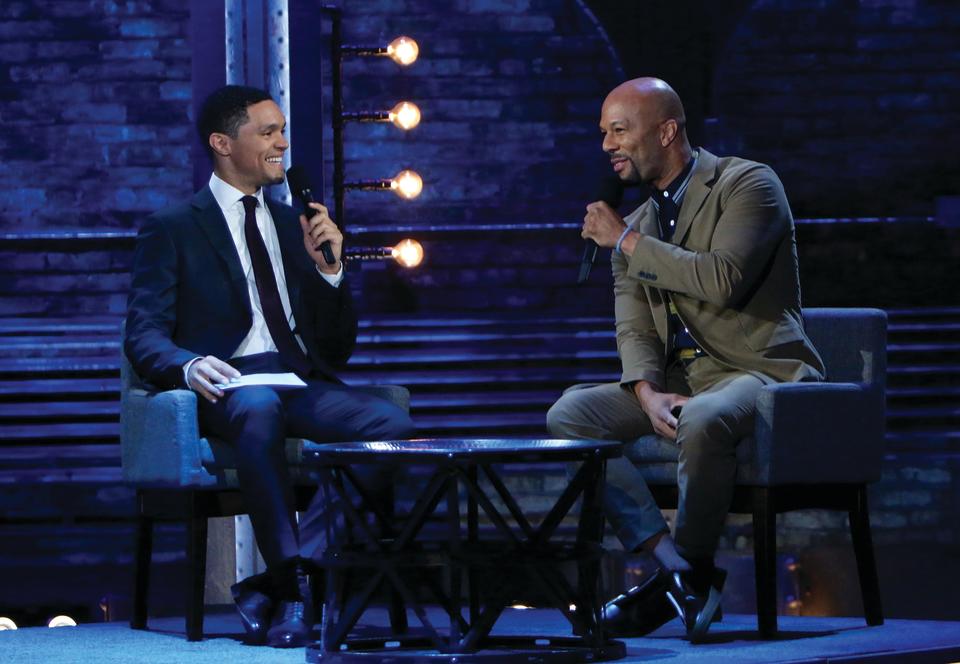
When I went to Australia for the first time, I discovered a world of Aboriginals that I’d never seen before in my life. I had always seen a romanticized image of these people. They liked living in the Outback. They liked not being part of communities. They liked, they liked, they liked. It’s like a fringe, cute thing.
It’s the same way I might have thought of Native Americans before I came to America. The images that I got in South Africa growing up was cowboys and Indians. And it was like, “Oh, they wear the feathers and they just enjoy themselves. They live on reservations by themselves. They’re cool.”
Then you get to America and you learn about what it actually means to be an indigenous person in this country. You see what happened with their land. You see what continues to happen with appropriation. You see how the image of them in the media is shaped in a certain way. And then you go, “Huh. My joke now doesn’t match the information I have in my head anymore.” And I can only make jokes based on the information I have in my head. And then I go, “Oh, this is not cool.”
I’ll give you an example, just one random joke. When I was in South Africa I would have fun joking about growing up in a world where black fathers were absent. Because I’d be making a joke for a black audience. We’d be having a good time. We know that not all black fathers are absent, but it’s a stereotype and a trope and you joke about what that is.
Get to America and you look at drugs and what’s been done to African-American communities. You look at police and the way they’ve incarcerated black men at an unfair rate, and you look at how many black men have been unfairly incarcerated. You look at weed, drugs, three strikes. You add up all of these things and then you go, “Man, the reason black fathers aren’t around is not funny to me now because I have information.” Once I have information, a lot of jokes don’t seem funny.
Some of the information you might have received after 2013 is that the indigenous Australian community has long dealt with the outside world disparaging its members as not conforming to the white world’s prevailing standards of beauty.
Or conforming to anything to be honest, conforming to society in general.
Right. But specifically in this case, with this joke, it was about beauty, attractiveness. Isn’t it the same as Roseanne Barr comparing Valerie Jarrett to an ape? She was dealing in old tropes of white people mocking black people by comparing them to apes. Whether or not she knew what she was doing, everyone has to decide for themselves.
I’ll put it to you this way: How did you not know that this idea of unattractiveness would be as sensitive as it turned out to be?
I want to go to the semantics of what you just said. You said it’s the “same as” Roseanne. Maybe it’s because you’re talking to me. I don’t think it’s the same as, and I’ll tell you why. If you—Roseanne—say Valerie Jarrett looks like an ape mixed with the Muslim Brotherhood, you—Roseanne—are making the statement, correct?
What I was trying to do, which I thought worked at the time—and then now, five years later, I’ve been told it didn’t work—was argue an argument.
So I had heard somebody say, “But Trevor, I’ve never seen an attractive Aboriginal woman.” That’s what I said in the joke. I said, “I know there are people who say…” So I was trying to flip the thing, which is what I always try and do with comedy. Do you get what I’m saying? I always try and take what people believe… I do it on The Daily Show all the time. I go like, “Oh, this is your argument? Let’s flip it on its head.” And so what I was saying was I know there are people who say, “I’ve never seen an attractive Aboriginal woman.” And I said two things. One, yet. You haven’t seen them all.
And then the part of the joke that I actually thought was the edgy thing that I’d get into trouble about was, “Who cares about your standard of beauty?”
Essentially, I was like, “For all you know, they’ll do things that are amazing in bed.” And that’s me as a simple guy five years ago thinking to myself that’s like a pro thing, a good thing. It was based around the notion of, “Yo, don’t write people off just because of one thing.” I was trying to counter the popular image that people have.
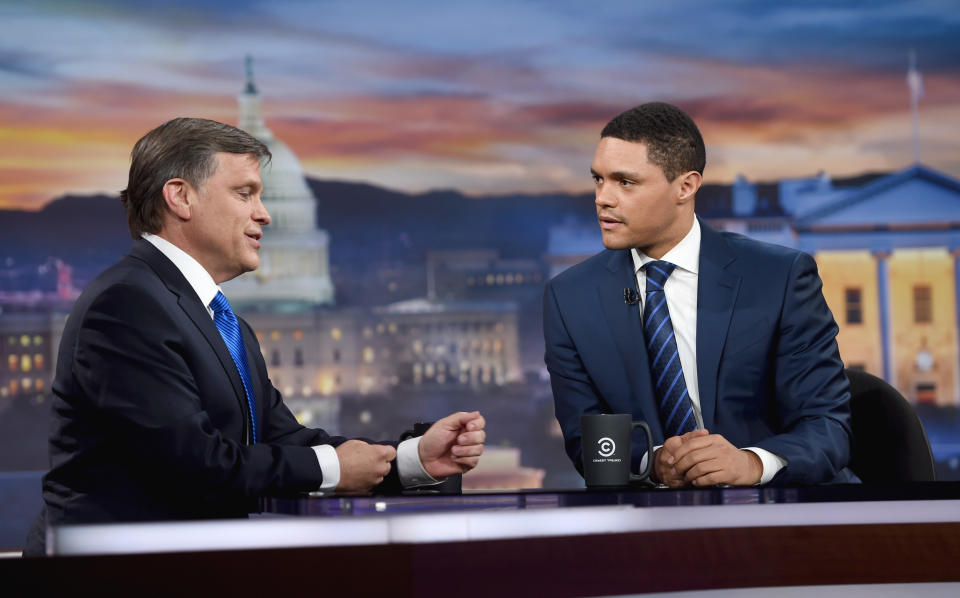
The sticking point for me came with the word “yet.” It struck me as though you were saying, “Well, I admit that the beautiful ones are few and far between, but they must be out there somewhere.”
No! What I was saying is that your exposure to these people is so limited that there’s a good chance you have not been exposed to many of them. So again, when we look at context and where you are in the world, in South Africa we had—have—no Mexican people. We have no Mexican restaurants. Maybe there’s one or two now. But as a cuisine and as a people, that is something we weren’t exposed to in South Africa. So there’s a good chance that, as a South African, the first time you meet a Mexican person is when you come to America or when you go to Mexico.
I grew up in a world where people would say statements like this all the time. I grew up in a school where my white friends would say, “Trevor, I don’t think black girls are attractive.” Then I’d be like, “No, man. How many black girls do you know?” And then they would only be able to count 10.
So what I’m saying is, you cannot make a statement like that because you have not seen enough of them to make a statement. That’s where I’m coming from.
I see that.
So your interpretation is “so few and far between” and I’m going like, “No.” I’m saying we have no exposure to Aboriginal people in South Africa.
Did you see where National Geographic came out and apologized for its racism?
I did.
They said, “We apologize because over the years we have almost purposefully presented images of communities around the world in a way that makes them look more primitive and more tribal, and we apologize.”
Then I go like, “You see. These are all the things that affect us as people.” If you grow up in a world where the only exposure you got to a certain race or a certain group of people was being cultivated in such a way to show you only one thing, are you then wrong for knowing that one thing? Or is the media that you’ve been fed to blame for what you believe is true information?
I know it’s weird, but I’m used to it when it comes to comedy. It’s part and parcel of what comedy is. I don’t think there’s ever been a time when comedians didn’t get into trouble for what they said.
But now you’re getting in trouble for what you said years ago.
There’s two things that I find interesting about that notion. One is when people use the term “unearthed,” like something was hidden. I always find that fascinating as a framing. “We’ve unearthed this video or joke.” There’s nothing to unearth. It’s a publicly available DVD that I released.
Unearth already implies a surreptitious [meaning]. It’s like, “Trevor hid this from you. He doesn’t want you to know.” No. I’ve never hidden any of my jokes. They’re my jokes. There’s my body of work for you to judge me on.
And a big thing a lot of people forget is that audiences are good at telling you when you’re going off course as a comedian. Ask any comedian about bombing. You say a thing, and the crowd can laugh, they can be silent, they can ooh, they can boo. But the audience will tell you where the joke is going.
So what I find interesting is sometimes what we want to do as people is we want to create an environment where we assign blame or an idea to a person or a thing, and for me, we ignore the context.
So they go, “Trevor Noah told this joke five years ago.” To whom? Did the people laugh? How many people were watching this? Do you get what I’m saying? And then you go, “Let’s look at all our possible options and think about it. Was this person just a wild maverick saying the most hateful things on stage in front of thousands of people? Or is it possible that the world continued to change?”
The Overton Window of what’s acceptable shifts in society, and it always has. Go back to the ’80s and watch comedy. Look at what people were saying about gay people. I was watching old episodes of sitcoms on TV. On Friends, every episode has a derogatory joke about gay people. And at that time that was society. I was part of that society as well. I’m not going to act like I was pure at the time. I had been shaped by my society. I thought that gay jokes were funny. I thought fat jokes were funny.
These are all things that have been shaped, and they move over time.
It doesn’t mean that it doesn’t weigh on me. It doesn’t mean it doesn’t shape me going forward. I’m always willing to accept that I’ve been part of a society that does things or that did things that it would not find acceptable today.
As Trevor, I continually have to define myself by the change because if I don’t then I will eternally self-flagellate myself for everything that I thought when I was 22. Good lord.
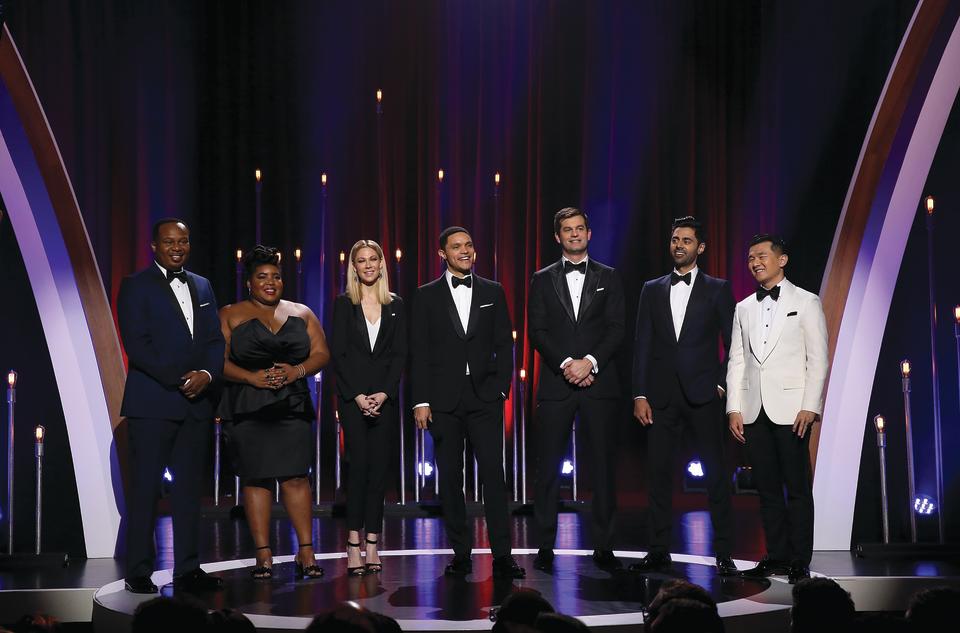
That’s a very rational, thought out response. I’m wondering, though, what’s it been like these past weeks for you, in your gut? Even if you believe that your words were totally out of context, is it upsetting still to hear that you’ve hurt people or upset people?
Here’s the best analogy I could use. It’s almost like I’m a toy manufacturer and now I’ve found out that somebody choked on one of my toys. That’s not what I intended when I made the toy. And someone would say, “But surely you should know that there’s a choking hazard.” I’m like, “Yeah, but I wasn’t thinking of that when I was making the toy. What I was trying to do with the toy was bring joy to people.”
As time progresses you learn how to make toys better. You change how you make them. You then are more intentional about which parts go where because you learn that this is a hazard. This is a choking hazard.
Look at what toys kids used to play with, and look at us now. We don’t go to Hasbro and say, “Do you apologize for what your toys did back then?” Hasbro goes like, “We don’t make that toy anymore because we didn’t like what was happening.” And so that’s how I feel. To say that I’m hurt I feel like makes it seem like I’m a victim in the thing, but I’m not. As a person, my emotions, I keep to myself and I go like, “Hey, man.” I work to get over it, and try and write better comedy all the time.
I am sad when a joke doesn’t make people happy because that’s what I’m trying to do. And that’s fundamentally all it is.
The big thing that frustrates me is that we live in a soundbite world. People would be shocked at how many times in this building we say, “In Trump’s defense, this is what he’s [trying] to say.” When Jeff Sessions was chanting, “Lock her up,” with those high school kids, I’m like, “No, he wasn’t.” He may have chuckled at the crowd and, yes, we can go look at Senator McCain [who corrected a woman for suggesting Obama was Muslim] and say, “Well, maybe he should have been more like McCain, a man of virtue, and said to the crowd, ‘Don’t do that.’” But that’s a different conversation, and I, as Trevor, will go, “Hey, man. The guy wasn’t chanting, ‘Lock her up.’” I’m not a fan of Jeff Sessions, but I don’t feel the need to unnecessarily put something on him when there’s more than enough stuff that’s not open to interpretation that I can put on him.
And so what frustrates me is that it’s just like I’m in a space where you have a five-minute interview [about his 2013 joke], and you’re on a phone with someone and it’s like, oh lord. How do I explain this to you in five minutes? How do I explain this to you in a way that gives it both the gravity and the nuance that it deserves? We don’t live in that world anymore.
The fact that we have these records—videos, tweets—that can be unearthed, to use the word you don’t like, is there a chilling effect with comedians? Or do you not allow yourself to think about it?
I don’t think there’s a chilling effect of unearthing comedians. I think there’s a chilling effect of people giving the words of comedians the same gravity that they would the words of politicians.
I’ll give an example. I think it’s crazy for myself that I’ve seen a joke that I made in 2013 occupy more time in a news cycle than something that the President of the United States said. That blows my mind. And this happens not just to me. It’s, “Dave Chappelle said this in his standup. Did you know Chris Rock said this? Trevor Noah said this. People are offended. Ricky Gervais said that…” Everywhere, everywhere, everywhere. And it’s interesting to me.
I’m not saying comedians should have no impact. Being a comedian I believe comes with the implicit risk of saying a thing that may offend someone, and then you tweak it. Chris Rock talked about when people in the audience began recording standup at shows. He said, “Good luck working on a joke anymore.” Because that’s what comedy used to be: you come in with an idea, it’s horrible, it’s raw, it doesn’t work. You start off with that idea. It’s maybe extremely sexist. You keep working it until you create this joke where people go, “Man, what a beautiful piece.” But if someone recorded that or got it at the wrong time, then they go like, “Oh, no. You’re sexist.”
The best way I can say it is, think of it like building a house. That’s what you’re trying to do with every joke. You’re trying to build a house. If someone comes and you’ve just dug the foundation, then you’re just some a**hole who dug a hole in the ground.
I know I can never please everybody. I know that I can never appease everybody. What I always try to do, though, is make sure that my body of work, hopefully, in time, when someone looks at it, will go, “Well, when I look at the body of his work, that’s what I will define him by.”
So I say to people, “Do you choose to define me by a joke here or there? Or do you choose to define me by my body of work and the journey that I’ve taken?” If you say, “He made those jokes long ago. He doesn’t make them now,” I ask you to process what that means. “He doesn’t make the jokes that he made when he was a younger person.” Yeah, I hope you would say that.
A friend of mine said to me, just to give me context because I was feeling really down at some point, my friend just turned to me and he said, “Do you ever think to yourself that all your scandals as Trevor Noah are about comedy?” I said, “What do you mean?” And he said, “If you’ve ever had a scandal as Trevor Noah, it’s about comedy. It’s about a joke. It’s about a joke. It’s about a joke. It’s about a joke.” He said, “That’s a pretty good life for you to be living.”
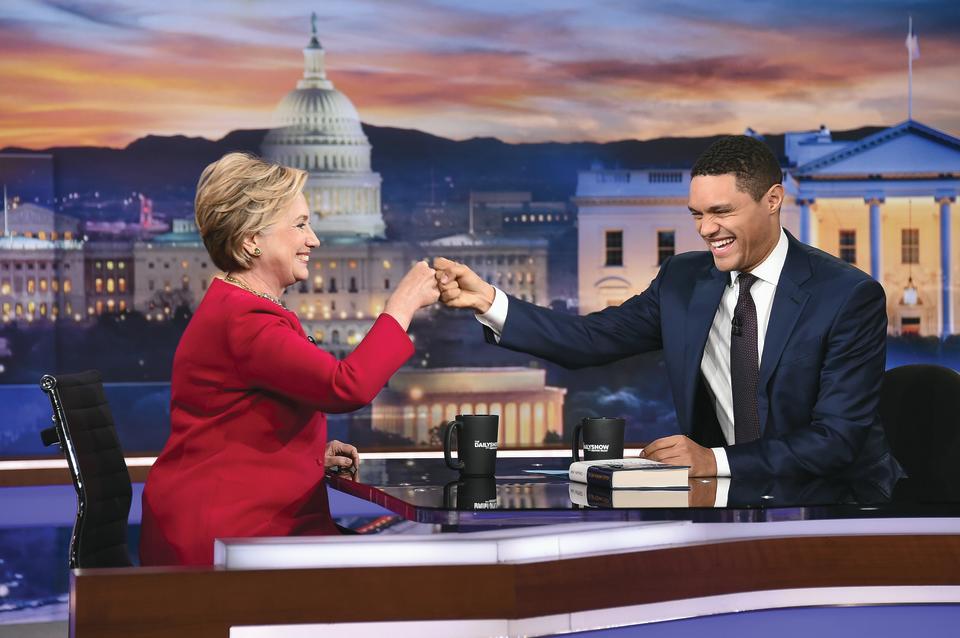
Is there anybody you wouldn’t have on your show?
No. I’ve invited everybody on the show. Before Trump was elected president, we had more Republicans on the show because they accepted our invitations, everyone from Rand Paul to Chris Christie.
Bill Maher says that about his HBO show too. Republicans won’t come on now.
Rand Paul, Chris Christie, Ben Carson, everyone came on our show. And what’s been really sad to see is how terrified people now are of crossing Trump or even being perceived to cross Trump.
Lindsey Graham came here before, gave his honest opinions on Donald Trump. Now he won’t touch us with a 10-foot pole. It’s like media silence now.
I remember Omarosa was coming here, and then literally like a few days before the interview, she canceled because the White House was like, “No, we don’t want you going.”
What a shame. And I’m not being sarcastic.
But that’s where we are now. That’s genuinely where we are now. People are just afraid of putting themselves in a space where their side may deem them a traitor, and the other side may create an environment that they feel is adversarial or not conducive to their agenda. But I continue to invite everybody to the show. I put out invitations all the time.
Dream guests, living or dead. And what would you ask them?
That’s an interesting one. I think I still would say Donald Trump, because I’m intrigued about the questions that people ask him versus the questions that I would want to ask him.
What would you ask him?
The question always changes because he always does new things. But it’s the where and the how of the asking. It’s interesting to watch how people ask him questions and why they ask him what they’re asking him.
And a guest who’s no longer living? That’s a really, really tough one because there are so many and you think about why you’re interviewing and what you’d be interviewing them for.
I guess probably now it would be Nelson Mandela. Or if it was an interview for The Daily Show I actually think the person I’d love to interview is Martin Luther King Jr., because I would love to get his perspective on how people see him today, how people have reshaped his message and ideas to suit them today, and how he perceives America. Has his dream been achieved? How does he respond to protests and what’s happening in the world?
Just going back to where we started in the conversation, there’s a classic example of interpretation. There are many people in America who think Martin Luther King is a peaceful-protest-only, non-oppositional, that’s-his-message-he-preached kind of person, and then when you read his works you realize that there is a lot that people have left out of him. And that’s what people can always choose to do. They can define you by a moment, but when they look through all of your work, you will find a much more nuanced and complicated individual to deal with. And so I would love to have him on the show.
Related stories
Samantha Bee's Team Trump Bad Boy Roundup Stars Paul Manafort, Donald Jr.
Tribune Media Scraps Merger With Sinclair Broadcast Group, Files Lawsuit For Breach Of Contract
Get more from Deadline.com: Follow us on Twitter, Facebook, Newsletter

